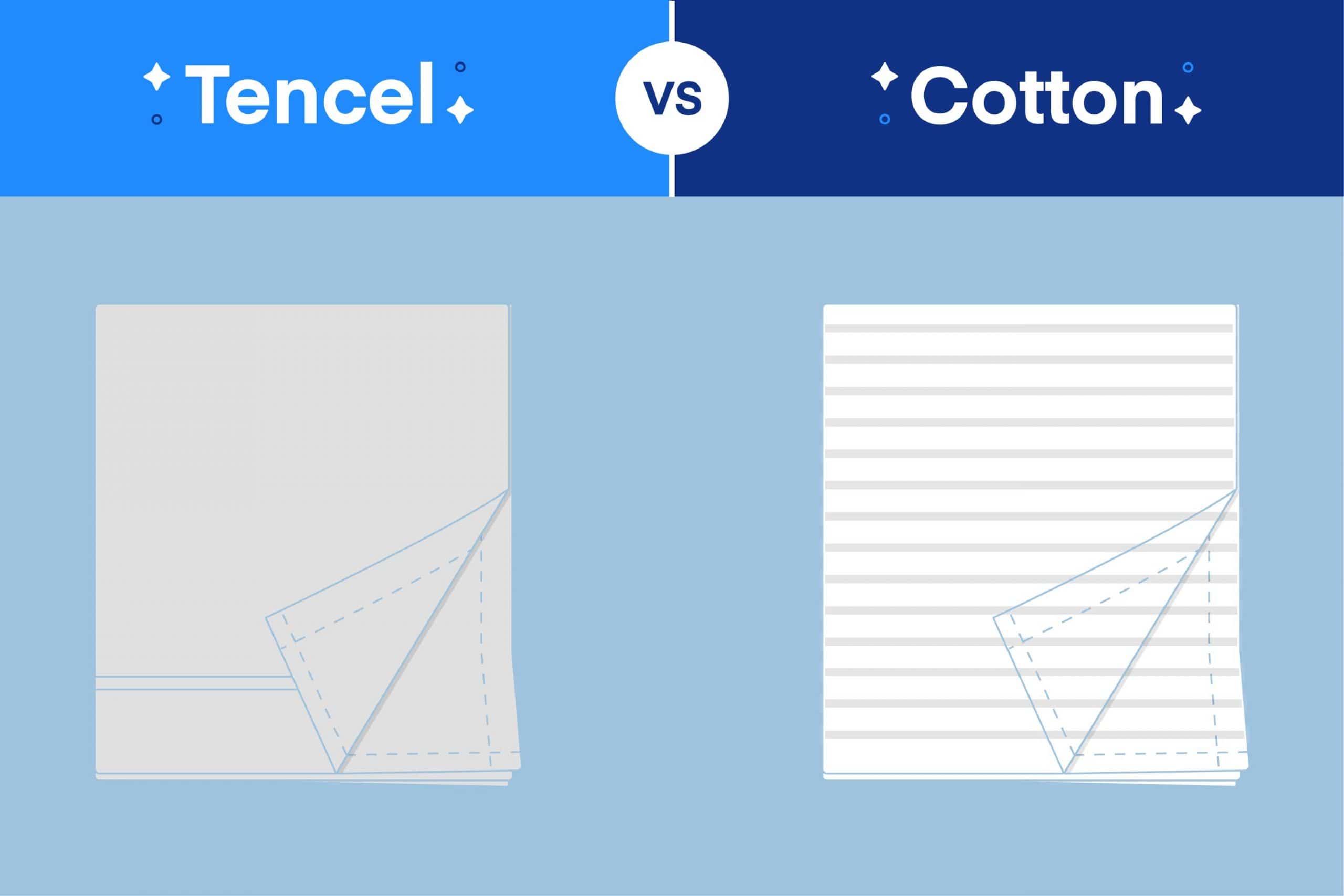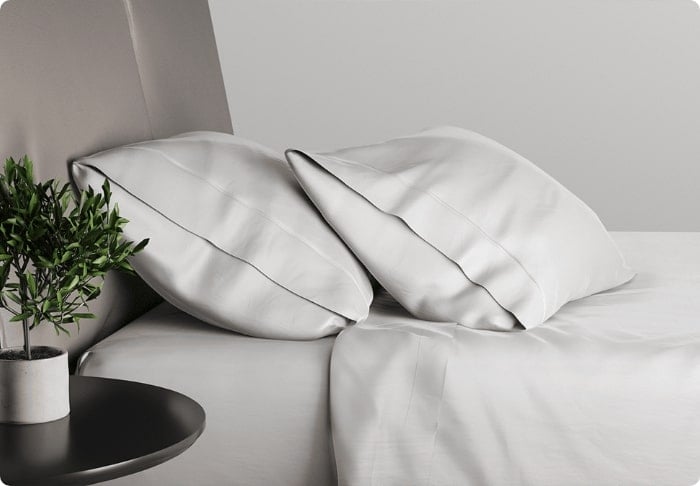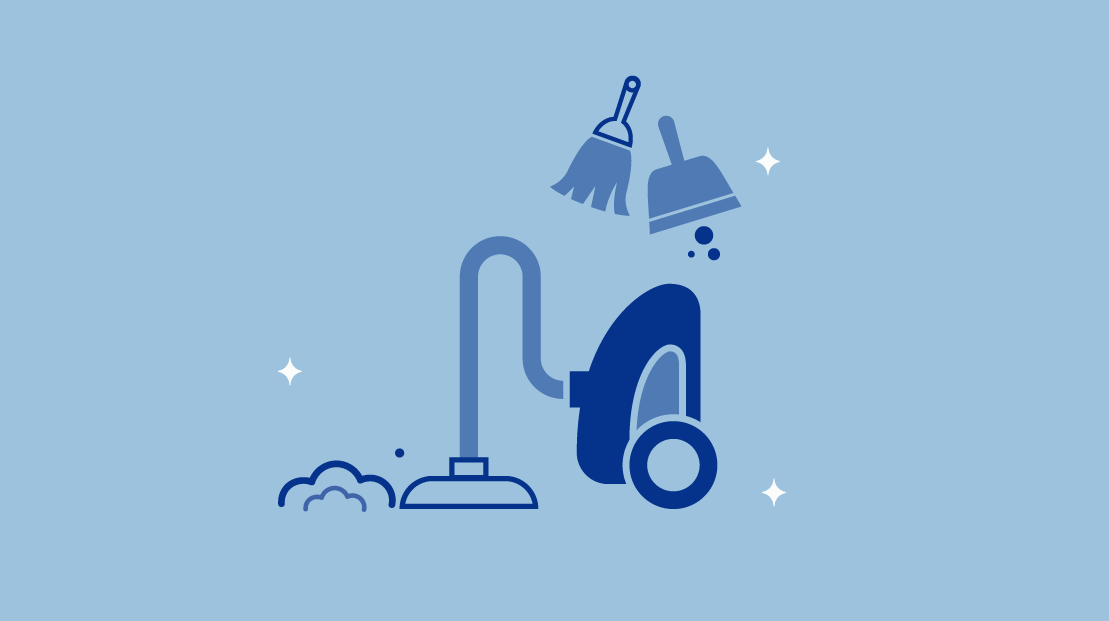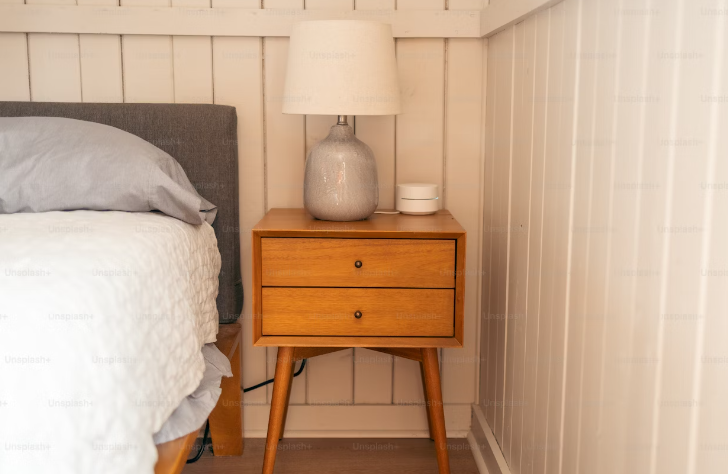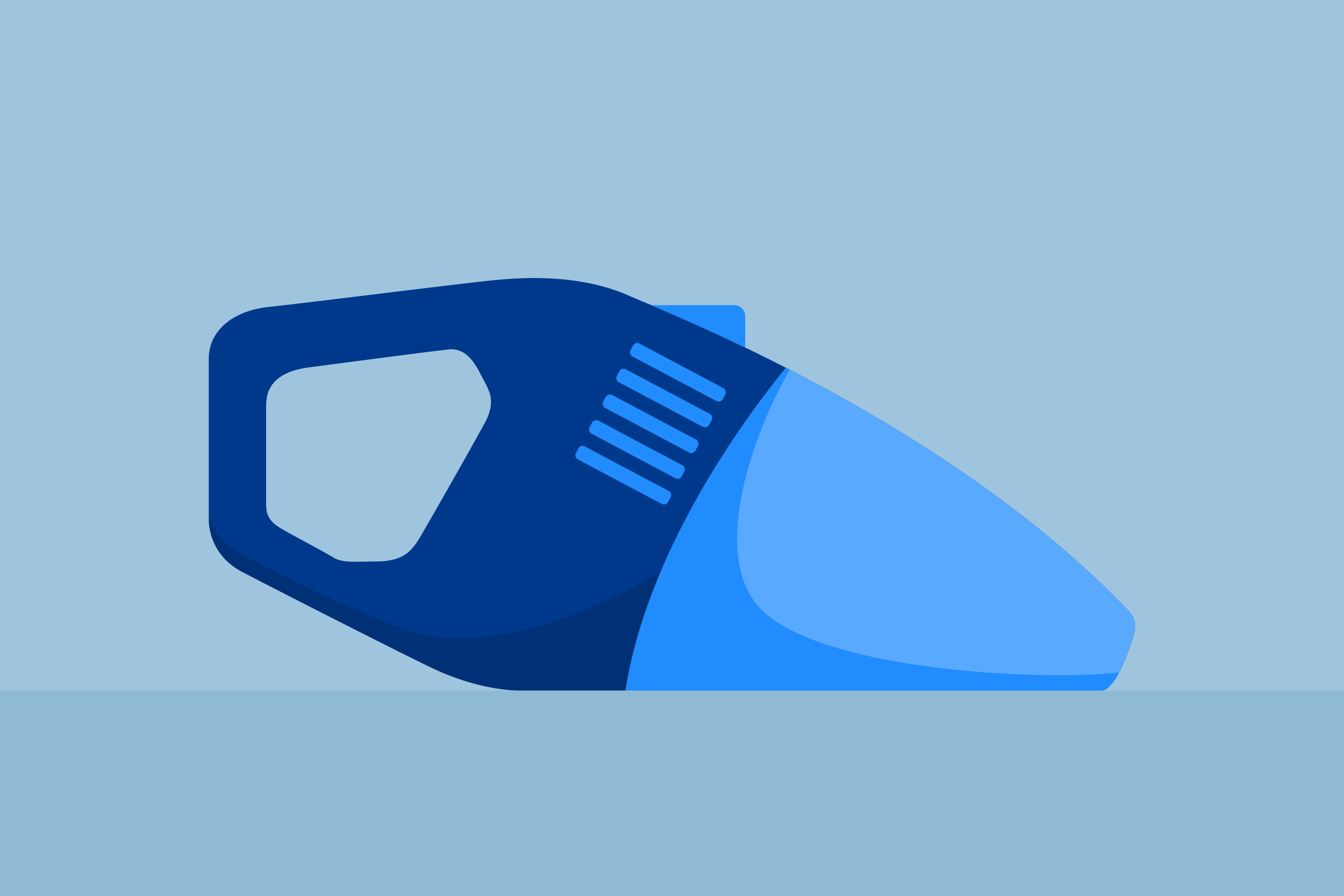Buying new sheets can be challenging especially when you have so many different options to choose from. While cotton sheets have been the fabric of choice for centuries, the eco-friendly Tencel sheets are also gaining popularity in the bedding industry.
Both the materials are soft and breathable, but there are some differences that set them apart. In this article, we discuss how these fabrics are made, their benefits, drawbacks, and differences.
What are Tencel® Sheets?
Tencel® sheets are made from the wood cellulose of eucalyptus trees. This smooth fabric feels silky soft and has a sheen to it. Its origin from the pulp of eucalyptus wood makes Tencel® sheets naturally cooling. The Tencel® fibers are super absorbent so they are a good choice for hot sleepers. They wick away night sweats keeping sleepers comfortable even in warm weather.
Tencel® is the brand name for lyocell fabric, which is a type of rayon. Rayons are regenerated fibers sourced from natural materials. These natural materials go through a production process to be converted into fibers. They are neither natural fibers like cotton or wool nor artificial fibers synthesized out of petrochemicals like nylon or polyester.
This semi-synthetic fiber is manufactured using a “closed-loop process”—almost all the solvents used in the production process get reused and don’t pollute the environment. The solvents break down the wood pulp, which is then reformed into fibers to make Tencel®.
The closed-loop manufacturing process of the regenerated Tencel® fiber makes it an eco-friendly fabric. Plus, the wood cellulose is extracted from eucalyptus trees grown in unirrigated lands without the use of chemical fertilizers or pesticides. Environmentally conscious people can take pride in using these sheets made with low environmental impact.
Benefits
- Eco-friendly materials give it a cooling feel, making it a perfect choice for hot sleepers
- Strong regenerated fibers make Tencel® sheets durable
- Hypoallergenic material absorbs moisture, preventing bacterial growth
- Smooth feel makes Tencel® sheets the best option for those with sensitive skin
- The silky texture of these soft sheets resists wrinkling
Drawbacks
- Has a higher price-point because the production process is expensive
- Maintenance may be difficult as some Tencel® sheets cannot be machine washed, or washed in hot water.
Our Amerisleep Tencel® Sheets
Our Amerisleep Tencel® Sheets with a 310 thread count feel extremely luxurious and smooth. This sustainable fabric controls heat and moisture, making it an excellent cooling sheet for hot sleepers. The plush smoothness prevents irritation or rashes in those with sensitive skin.
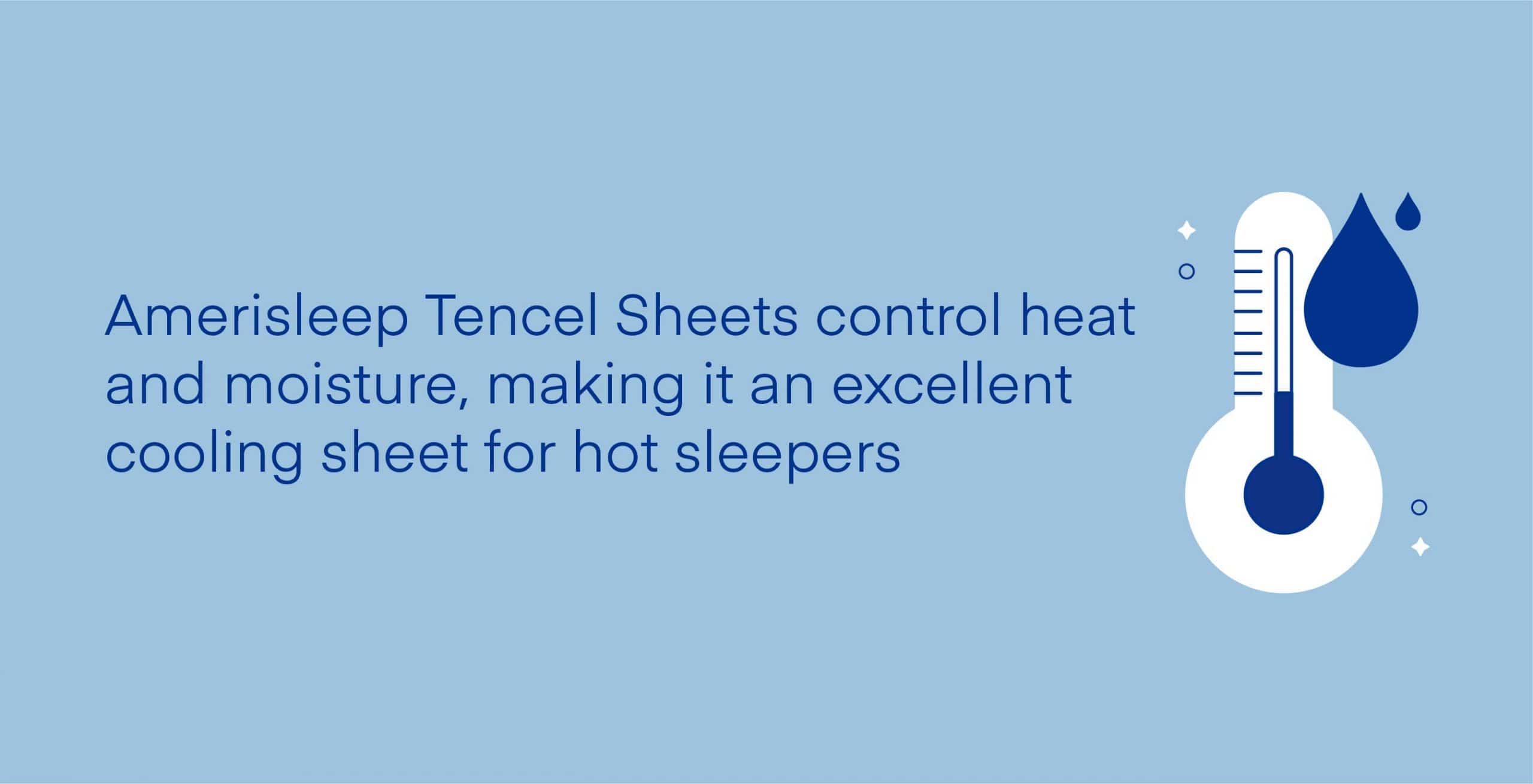
The fitted sheets in our Tencel® sheet sets have deep pockets to fit mattresses up to 18 inches deep. They include Smarty BandZz®, a smart system to prevent bunching and wrinkling.
Our Tencel® sheets are easy to care for. You can put them in the washing machine on either the cold or warm cycle and tumble dry on low heat.
Prices of our Amerisleep Tencel® Sheets
Amerisleep Tencel® Sheets are available in two different colors and seven standard sizes, including the difficult to find split king option. Our sheet sets include 1 fitted sheet, 1 oversized flat sheet, and 2 pillowcases.
| Size | Price |
|---|---|
| Twin | $155 |
| Twin XL | $190 |
| Full | $215 |
| Queen | $230 |
| King | $275 |
| California King | $275 |
| Split King | $315 |
What are Cotton Sheets?
Cotton sheets are made of natural fibers growing from the seedpod of cotton plants. This fluffy, breathable fiber has been used to make fabric for thousands of years. Cotton is extensively produced in the United States and is available in a wide variety of prices.
The quality and price of this natural fabric depend on the length of the fiber, called staple. The longer the fiber the more luxurious and soft the fabric feels. Long-staple cotton is a popular choice for bedsheets due to its superior quality and plush, luxurious feel. The long cotton fibers are less prone to breaking, making the sheets strong and extremely durable. Most Egyptian Cotton or Pima Cotton bedsheets include long-staple cotton.
Short-staple cotton does not feel as plush and luxurious as long-staple because the shorter length fibers break down faster, leading to more pilling on the fabric. This damages the quality and feel of the bedsheets. Short-staple cotton sheets are inexpensive, but they don’t last for long.
Benefits
- Cool, crisp, and breathable fabric, good for hot sleepers
- Gets softer with every wash
- Easy to maintain as most sheets can be machine washed in hot water
- Available in a wide price range
Drawbacks
- Cotton is prone to wrinkling, and it may require ironing to flatten the creases
- Too many options make it difficult for buyers to spot good quality sheets
- Not very eco-friendly because cotton plants need a lot of water, chemical fertilizers, and pesticides, though organically grown cotton is not sprayed with chemicals
Our Amerisleep Cotton Sheets
Our Amerisleep Percale Cotton Sheets with a 300 thread count feel plush and breathable. We use long-staple Pima cotton to make these luxurious percale weave sheets. Percale is a weave of fabric with a simple criss-cross pattern. The yarns go one-under-one-over, creating a tight-knit structure.
The tight percale weave strengthens the fabric, making it durable and resistant to pilling. These finely woven bed sheets have a matte finish and are extremely breathable.
Prices of our Amerisleep Cotton Sheets
Amerisleep Percale Cotton Sheets are available in plain and stripe patterns. You can choose one to suit your style and bedroom decor. These sheets are available in seven standard sizes and are backed by a 5-year-limited warranty.
| Size | Price |
|---|---|
| Twin | $110 |
| Twin XL | $120 |
| Full | $130 |
| Queen | $150 |
| King | $170 |
| California King | $170 |
| Split King | $180 |
Difference Between Tencel® and Cotton Sheets
Tencel® fabric is made with regenerated fibers, while the cotton fabric is made with natural fibers. Despite the difference in fibers, both the fabrics are soft, breathable, and hypoallergenic, but they vary in certain parameters.
| Parameters | Tencel® | Cotton |
|---|---|---|
| Fabric Feel | Soft and smooth, with a sheen | Crisp, gets softer with every wash |
| Durability | Durable, but needs careful handling | High-quality long-staple cotton is durable, but short-staple cotton is not durable |
| Maintenance | Some sheets may need hand-washing, while others can be machine washed on a gentle cycle | Almost all cotton sheets can be machine washed on a regular cycle, but always read the care label for instructions |
| Price | More expensive than cotton | Less expensive than Tencel® |
| Wrinkle Resistance | Wrinkle-resistant | Prone to wrinkling |
| Resistance to Pilling | More resistant to pilling than cotton | Cotton is more prone to pilling than Tencel®; inferior quality cotton pills faster due to the shorter fiber length |
| Shrinkage | May shrink a bit after first wash, but resists shrinkage after that | Cotton shrinks more than Tencel®, but the amount of shrinkage depends on cotton quality |
| Cooling | Breathable and absorbent material wicks away moisture | Breathable material, but can’t wick away moisture as much as Tencel® |
| Environmentally Friendly | Environmentally friendly fabric | Not as environmentally friendly as Tencel® |
Factors to Consider When Buying Sheets
The feel of your sheets is crucial in making you comfortable enough to relax and get a good night’s sleep. While your bedsheet’s color and design enhance the look of your bed, factors like material, thread count, and weave determine its feel.
Material
If you want crisp sheets, cotton will suit you more. It gets softer with every wash. Tencel® bedding has a smoother finish and feels silky-soft from the first day of use. Both the materials are breathable, but Tencel® is more absorbent than cotton, making Tencel® the best choice for hot sleepers.
We also have guides comparing and contrasting other common sheet materials, for those who want to more fully consider all their options:
- Bamboo vs. Tencel Sheets: What’s the Difference?
- Bamboo vs. Cotton Sheets: What’s the Difference?
- Cotton vs. Microfiber Sheets: What’s the Difference?
- Lyocell vs. Cotton Sheets: What’s the Difference?
- Flannel vs Cotton Sheets: What’s the Difference?
- Linen vs Cotton Sheets: What’s the Difference?
Thread Count
Thread count refers to the number of horizontal and vertical threads per square inch. It determines the smoothness and durability of your sheets. Anything between the range of 300 to 600 is perfect for a premium quality bed sheet.
Generally, a higher thread count means a more luxurious bed sheet because more yarns fitting into a square inch space make the sheet smoother. But this may not always be the case as sheet makers can artificially inflate the thread count by using multiple-ply yarn. Be wary of bedsheets with a thread count higher than 600. Individual inferior quality threads are twisted around each other to increase the thread count.
Weave
The weave of your bedsheet determines its texture. There are different kinds of weaves such as percale, sateen, and twill. Tencel® sheets usually have a sateen weave, making the sheets feel silky soft. Cotton bed sheets are usually best in a percale weave because this tight weave makes the sheets durable.
Color and Design
Color and design are personal choices, but people usually prefer light, pastel shades during the summer because they don’t absorb heat. Earthy and darker shades are good for cold, winter months. White sheets are a classic, but they tend to yellow with age and require you to whiten the sheets with one of several items.
FAQs
Are Tencel® sheets worth it?
These soft sheets are usually more expensive than traditional cotton, but they offer good value for money. Tencel® sheets feel silky smooth and have a sheen, making them look and feel good. They are a perfect choice for hot sleepers and those living in warm weather because this breathable fabric, wicks away night sweats. The absorbent feature of this luxury fiber makes it hypoallergenic as well. It prevents bacterial growth, which could trigger allergies. Its soft feel from the first day of use is good for those with sensitive skin because it minimizes the risk of skin irritation or rashes.
Can you wash cotton sheets in hot water?
Yes, most cotton sheets can be washed in hot water but we recommend checking the instructions on the care label before washing any sheet. Sometimes the high temperature may damage the quality of some fabrics. Washing in hot water is usually recommended because the high water temperature kills allergens.
Can you put Tencel® sheets in the dryer?
Yes, you can put them in the dryer on a low heat setting. Care instructions may vary from brand to brand so it’s always better to check them before laundering your sheets. Sometimes Tencel® fabrics can become stiff if they are allowed to air dry. You can soften them by putting them in the dryer on a low-temperature setting for 10 to 15 minutes.
Is Tencel® natural or synthetic?
Tencel® is neither natural fabric like cotton or wool nor synthetic fabric like nylon and polyester. It’s a semi-synthetic fabric derived from natural materials, which goes through a production process involving non-toxic chemicals. The wood pulp of eucalyptus trees is used to make these cellulosic Tencel® fibers.
What is the best material for sheets to keep you cool?
Natural fibers like cotton and linen sheets are good for keeping you cool. Even Tencel® sheets are a good option because they are not only breathable but super absorbent as well. You can choose from any of these different materials to keep yourself cool and enjoy a night of quality sleep.
Conclusion
It may be difficult to choose between cotton and Tencel® because both of them are soft and breathable, the most important factors to consider when buying sheets. If you have sensitive skin the smooth surface of a Tencel® sheet may suit you better than cotton sheets. They also absorb moisture avoiding chances of allergen build-up on your sheets, but cotton sheets can be more affordable than Tencel® sheets.
You may find more options in colors and designs as well because cotton sheets are more widely available than Tencel® sheets. Depending on your priorities, you may choose any of these fabrics for your comfort in bed.
About the author
Stacy Liman is a journalism graduate student and a freelance writer with a focus on mindfulness and content marketing. Her passion for understanding and writing about the science of sleep enables her to provide valuable insights into achieving healthier and deeper rest. Stacy's commitment to helping people improve their sleep drives her exploration of new mattresses and sleep-promoting gadgets.
View all posts